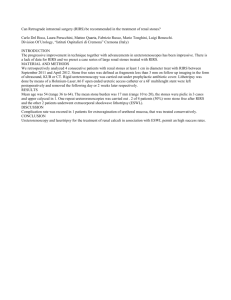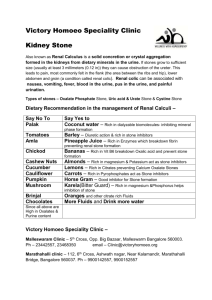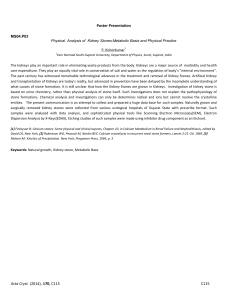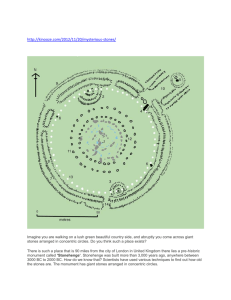stone disease
advertisement
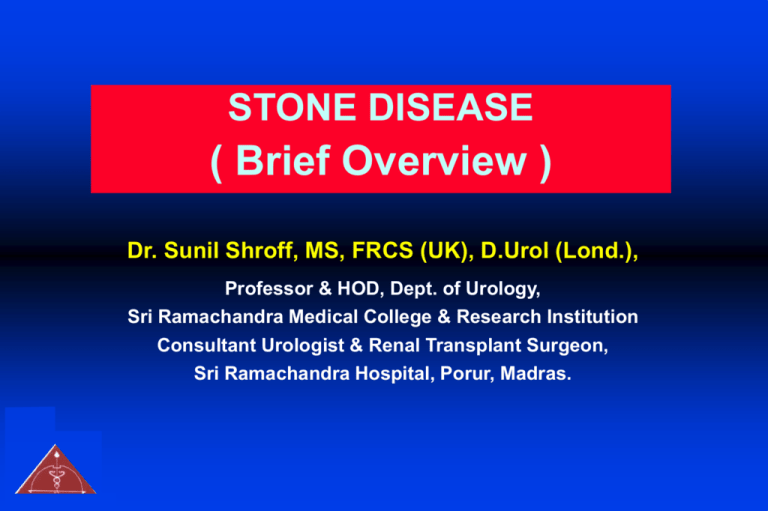
STONE DISEASE ( Brief Overview ) Dr. Sunil Shroff, MS, FRCS (UK), D.Urol (Lond.), Professor & HOD, Dept. of Urology, Sri Ramachandra Medical College & Research Institution Consultant Urologist & Renal Transplant Surgeon, Sri Ramachandra Hospital, Porur, Madras. COMPARATIVE INCIDENCES OF FORMS OF URINARY LITHIASIS Stone analysis in Percentage Form of Lithiasis India USA Japan UK Pure Calcium Oxalate 86.1 33 17.4 39.4 Mixed Calcium Oxalate and Phosphate 4.9 34 50.8 20.2 Magnesium Ammonium Phosphate (Struvite ) 2.7 15 17.4 15.4 Uric Acid 1.2 8.0 4.4 8.0 Cystine 0.4 3.0 1.0 2.8 Cause of Stone Disease • Supersaturation of urine is the key to stone formation • Intermittent supersaturation - Dehydration • Crystal aggregation • Anatomic Abnormailities – PUJ , MSK • Bacterial Infection • Defects in transport of Calcium and Oxalate by Renal epithelia E.Coli infection increases matrix content in urine . Proteus makes urine alkaline Inhibitors & Promoters of Stone Formation in Urine INHIBITORS PROMOTERS Inhibits crystal Growth • Citrate – complexes with Ca • Magnesium – complexes with oxalates • Pyrphosphate - complexes with Ca • Zinc Inhibits crystal Aggregation • Glycosaminoglycans • Nephrocalcin • Tamm- Horsfall Protein • • • • • • • Bacterial Infection Matrix Anatomic Abnormalities – PUJ obst., MSK Altered Ca and oxalate transport in renal epithelia Prolonged immobilisation Increased uric acid levels I.e taking increased purine subs– promotes crystalisation of Ca and oxalate ?? Nanobacteria – seen in 97% of renal stones SOME DISEASES ASSOCIATED WITH HYPERCALCAEMIA & HYPERCALCIURIA Hyperparathyroidism Leukemia Sarcoidosis Lymphoma Multiple myeloma Myxedema Hyperthyroidism Adrenal Insufficiency Metastatic Malig. Neoplasm's Vit. D Intoxication TYPES OF KIDNEY / URETER STONES • OXALATE (CALCIUM OXALATE) • PHOSPHATE • URIC ACID & URATE • CYSTINE Uncommon Stones XANTHINE STONES – (Autosomal Recessive . Def of Xanthine Oxidase leading to Xanthinuria) DIHYDROXYADENINE STONE – ( Def. of enzyme adenine phospo ribosyl transferase ) SlLICATE STONES – Rare in humans ( excess intake of Antacid with Mg Trisilicate. Mostly in cattle due to ingestion of Sand ) MATRIX - Infection by Proteus - Radiolucent (all calculi have some amt ( 3%) of matrix but matrix calculus has 65% Matrix content in calculi) Uncommon Stones TRIAMTERENE – Anti-hypertensive used with hydroclorothiazide – spare Potassium. Mostly found as a nucleus in Ca oxalate or uric acid calculus Indinavir Stones - Drug to treat AIDS (4 to13%) Ephedrine or Guifenesin – Cough medicine - Radiolucent Stones – Chemical Constituents • Whewelite – Calcium Oxalate Monohydrate – CaC2O4-H2O • Weddelite - Calcium Oxalate dihydrate – CaC2O4-2H2O • Brushite – Calcium Hydrogen phosphate dihydrate – CaHPO4 2H2O • Whitlockite - TriCalcium Phosphate – Ca2(PO4)2 • Struvite – Magnesium Ammonium hexahydrate – MgNH4PO4-6H2O DD of Radiolucent filling defect on IVU in Ureter or Kidney Must Know Know For Brownie Points • • • • • • • • • • • Uric Acid Calculus Matrix Calculus Sloughed Papilla Blood Clots TCC Renal Cysts Vascular Lesions • • • • • Xanthine Calculus Hydroxyadenine Calculus Ephederine Calculus Infection due to gas forming Org. Fungal Ball Tuberculoma Malacoplakia Hypertrophied Papilla Renal pseudo-tumour OXALATE (CALCIUM OXALATE) • ALSO CALLED MULBERRY STONE • COVERED WITH SHARP PROJECTIONS • SHARP MAKES KIDNEY BLEED (HAEMATURIA) • VERY HARD • RADIO - OPAQUE Under microscope looks like Hourglass or Dumbbell shape if monohydrate and Like an Envelope if Dihydrate PHOSPHATE STONE • USUALLY CALCIUM PHOSPHATE • SOMETIMES CALCIUM MAGNESIUM AMMONIUM PHOSPHATE OR TRIPLE PHOSPHATE • SMOOTH MINIMUM SYMPTOMS • DIRTY WHITE • RADIO - OPAQUE Calcium Phosphate also called ‘Brushite’ appears like Needle shape under microscope PHOSPHATE STONES IN ALKALINE URINE ENLARGES RAPIDLY TAKE SHAPE OF CALYCES STAGHORN Struvite can form Stag-horn and appear like coffin lid under microscope CALCIUM PHOSPHATE STONES • Hyperparathyroidism Ca P • Renal Tubular Acidosis K CO2 • Medullary Sponge Kidney - PTH Hormone Promotes renal production of 1-25-dihyroxycholecalciferol – active Vit.D and also increases absorption of Calcium and decreases Phosphorus absorption from Kidneys URIC ACID & URATE STONE • HARD & SMOOTH • MULTIPLE • YELLOW OR RED-BROWN • RADIO - LUCENT (USE ULTRASOUND) Under microscope appear like irregular plates or rosettes pKa of uric acid 5.75 – at this pH 50% of uric acid insoluble. If pH falls further - uric acid more insoluble CYSTINE STONE • AUTOSOMAL RECESIVE DISORDER • USUALLY IN YOUNG GIRLS • DUE TO CYSTINURIA • CYSTINE NOT ABSORBED BY TUBULES • MULTIPLE • SOFT OR HARD – can form stag-horns • PINK OR YELLOW • RADIO-OPAQUE Under microscope appears like hexagonal or benezene ring – ask for first morning sample CYSTINE STONE - Management • High Fluid Intake and Alkalanise Urine – dissolve most of the smaller cystine stones • D-Pencillamine or MPG (Mercaptopropionylglycine) binds to cystine that is soluble in urine • Side effects of Pencillamine restricts it use – Allergic rashes, GI problems- Nausea, Vomiting, Diarrhoea • MPG better tolerated • Large obstructive stones – Surgery required first pKa of cystine is 8.3, hence alkalinisisation above pH7.5 helps to dissolve the stones Cyanide Nitroprusside Calorimeteric Test for detecting Cystinuria. If positive do amino acid chromatography Surgical Conditions and Stone Disease • Regional ileitis and Ileal Bypass Surgery for eg Obesity can lead to increase oxalate absorption and stone ds • ileostomies - In Chr. Diarrhoea with– Bicabonate loss – systemic acidosis and acidic urine – increases risk of Uric Acid stones HISTORY A. IS PATIENT DRINKING ENOUGH ? B. PROFESSION C. ENQUIRE ABOUT UTI STONES D. FAMILY HISTORY E. LONG ILLNESS BEDRIDDEN STONES MANAGEMENT OF STONES HISTORY : A. FIND OUT IF DRINKING ENOUGH LIQUIDS (NOT DRINKING ENOUGH IMPORTANT CAUSE OF STONE FORMATION & GROWTH) Urinary supersaturation of salts in concentrated urine Atleast drink 3 lits to avoid stone formation HISTORY (Cont...) B. ASK ABOUT THEIR PROFESSION DEHYDRATION STONES CAN FORM e.g. • MARATHON NEAR A FURNACE, • BRICK - LAYER, LABOURERS & WEAVERS • TRUCK & BUS DRIVERS HISTORY (Cont...) C. ENQUIRE ABOUT UTI STONES D. FAMILY HISTORY E. LONG ILLNESS BEDRIDDEN STONES Zero Gravity state – astronauts on long space flights more prone to stones CLINICAL FEATURES 1. PAIN IN 75 % OF THE CASES “RENAL COLIC” IF SEVERE AND ACUTE A) KIDNEY STONE FIXED PAIN IN THE LOIN B) URETERIC STONE PAIN RADIATES LOIN TO GROIN Both Stomach & Kidney supplied by celiac ganglion hence Nausea & vomiting common in renal colic CLINICAL FEATURES (Contd....) 2) HAEMATURIA • CAN BE FRANK • OR ONLY FOUND ON DIP - STICK OR LAB. 3) PYURIA - IF INFECTION CAN HAVE PUS IN URINE ON EXAMINATION 1. ACUTE PRESENTATION • ABDOMEN TENSE AND RIGID • TENDERNESS PRESENT IN THE LOIN 2. IN ROUTINE PRESENTATION • NO FINDINGS IN ABDOMEN INVESTIGATIONS 1. FULL BLOOD COUNT TO CHECK FOR ANAEMIA IF GOING FOR SURGERY 2. SERUM ELECTROLYTES PLUS UREA / CREATININE / CALCIUM / URIC ACID / PHOSPHATE INVESTIGATIONS (Cont...) 3. 24-HOURS URINE FOR ELECTROLYTES (Only if recurrent stone former) CALCIUM / OXALATE / URIC ACID / CYSTINE / CITRATE INVESTIGATIONS (Cont...) 4. PLAIN KUB X-RAY OF ABDOMEN (Mandatory) 5. IVU OR IVP (INTRA VENOUS UROGRAM) 6. ULTRASOUND (Mandatory) INVESTIGATIONS IVU OR IVP (INTRA VENOUS UROGRAM) • Not Mandatory • 1in 40,000 patients die due to anaphylactic reaction to contrast • Useful for radio-lucent stones & to detect Congenital Anomalies in Urinary tracts INVESTIGATIONS (Cont...) 7. CT – TO LOOK AT UNUSUAL ANATOMY OF THE KIDNEY To differentiate cause of acute colic – stone or anuria Suspected due to stone disease 8. DMSA OR DTPA OR MAG3 RENOGRAM - TO STUDY FUNCTION OF EACH KIDNEY. Bilateral Ureteric Calculus in a patient presenting with Anuria Helical or Spiral CT provides 3D reconstruction. Helical refers to path the X ray follows on Gantry. These are rapidly performed and do not require contrast agents for reconstruction. MANAGEMENT OF UROLITHIASIS • Non-invasive approach to urinary calculasHALLMARK of last 20 yrs. • Lithotripters – 1.Extra Corporeal Shock wave 2.Intra Corporeal • Better fiber optics – Miniturisation of Telescopes • Accessories - Innovative variety Modern Management of Urolithiasis • • • • ESWL Ureterorenoscopy Percutaneous Nephrolithotomy Laparoscopic Approach to stones Open Ureterolithotomy, Pyelolithotomy or Nephropyelolithotomy is required in less than 1 to 2% of modern stone management TREATMENT (IDEALLY) MAJORITY : 80 TO 85 % of all stones can be treated by EXTRA - CORPOREAL SHOCK WAVE LITHOTRIPSY (ESWL) MINORITY : 15 TO 20 % SHOULD NEED MINIMALLY INVASIVE SURGERY (PCNL / URETEROSCOPY) (LESS THAN 1 % SHOULD NEED OPEN SURGERY) EXTRA - CORPOREAL SHOCK WAVE LITHOTRIPSY (ESWL) SHOCK WAVES GENERATED UNDER WATER CAN TRAVEL THROUGH BODY WITHOUT ANY APPRECIABLE LOSS OF ENERGY. WHEN THEY ENCOUNTER STONES THE CHANGES IN DENSITY CAUSES ENERGY TO BE ABSORBED AND REFLECTED BY THE STONE & THIS RESULTS IN FRAGMENTATION OF THE STONES. ESWL – For Urinary Tract Calculus ESWL- FOUR MAIN ELEMENTS 1. 2. 3. 4. ENERGY SOURCE FOCUSING DEVICE COUPLING DEVICE LOCALIZATION DEVICE ESWL Absolute Contra-indicationPregnancy Relative Contra-Indications for ESWL – • Renal Colic • • • • Urinary obstruction Infection Declining Renal Function Significant Hematuria COUPLING DEVICE “WATER BATH” “WATER FILLED CUSHION” (KEEP PATIENT’S DRY) ESWL-HISTORY 1963-EXPERIMENTS WITH “ SHORT WAVES” IN W.GERMANY BY PHYSICISTS AT DONIER SYSTEMS LTD 1980-DORNIER HUMAN MODEL ( HM-3) LITHOTRIPTER ARRIVED ON MARKET (STILL GOLD STANDARD WHEN COMPARING RESULTS WITH NEW MEASUREMENTS ESWL & STAGHORNS • Dornier HM-3 Monotherapy for STAGSHORNS 30% Stone Free Rate (In Dilated Collecting System ) • PCNL has higher overall Success • Combination of PCNL & ESWL can give a stone free rates of 90% For ALL STONES IN THE KIDNEY COMPRESSION-TENSILE WAVE CAUSES: “Implosion” Rather than “Explosion” ESWL & URETERIC CALCULI • For fragmentation fluid medium around stone necessary • If stones impacted fragmentation may not occur • “PUSH & BANG”-success Marginally HIGHER THAN “in situ ESWL” • Trial of “in situ ESWL” – first choice • “In situ ESWL” FAILS- “Rescue procedure” ESWL COMPLICATIONS • Haematuria – is quite common ( short term antibiotics Recommended ) • Incomplete stone Fragmentation & Obstruction • “Stienstrasse” ( stone street ) usually due to a large “ Leading fragment” ( Stents Recommended prior to ESWL for Calculi > 1.5 cm ) DESIGN BASIC LITHOTRIPSY Renal Lithiasis Blood Pressure Study ( Patients treated 1984-1986 Dallus Study) First Follow Up Second Follow Up 1988 1990 No.Pts Annualized Rate No.Pts Annualized Rate of Hypertension of Hypertension ESWL 771 2.5% 590 2.1% non-ESWL 195 3.8% 155 1.6% Total 966 745 Basic Principles of “SHOCK WAVE” Lithotripsy FRAGMENTATION BY SHOCK WAVES ON COLLISION OF “ SHOCK WAVES” WITH CALCULI• ON FRONT SURFACE – COMPRESIVE FORCES • ON BACK SURFACE OF THE STONEREFLECTION OF COMPRESSION PULSE CREATES NEGATIVE OR TENSILE WAVE THAT TRAVEL BACK WARD THROUGH CALCULI • ONCE TENSILE FORCE EXCEEDS “ COHESIVE STRENGTH” OF CALCULI- FRAGMENTATION OCCURS ESWL – SPARK GAP/ EHL • Electro-hydraulic Generator Located at Base of Water Bath • Produces Shock wave by Electric Spark Gap of 15,000 to 25,000 Volts Lasting 1 Sec • High Voltage Spark Discharge Rapidlyevaporates Water & Generators A “Shock Wave” by expanding Sarrounding Liquid Mechanism of Stone Fragmentation by ESWL • On Front Surface – Compresive or positive Forces • On Back Surface Of The StoneReflection Of Compression Pulse Creates Negative Or Tensile Wave That Travel Back Ward Through Calculi • Once Tensile Force Exceeds “ Cohesive Strength” Of Calculi- Fragmentation Occurs • Cavitation – Small air bubbles Steinstrasse ( or Stone Street) – Post ESWL Diet & Fluid Advice • High Fluid Intake • Restrict Salt (Na) • Oxalate Restrict • Avoid high intake of Purine food • Increased citrus fruits may help • If hypercalciuria restrict Ca intake Role of Potassium Citrate in preventing Cal Oxalate stone ds – KCit lowers urinary calcium whereas Na Citrate does not lower Calcium due to Sodium load LIQUIDS Moderate Amounts : High Amounts : Apple Juice Cocoa Beer Fresh Tea Coffee Cola FOODS : Almonds, Asparagus, Cashew Nuts, Currants, Greens, Plums, Raspberries, Spinach HIPPOCRATIC OATH : “I Will not cut, even for the stone, but leave such procedures for the practitioners of the craft”

